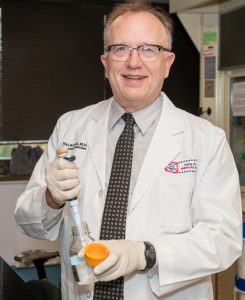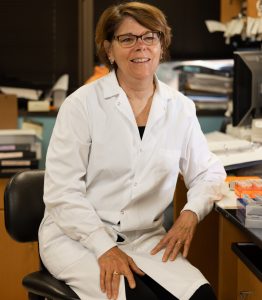Just in time for cold and flu season, several new options are available to prevent a common but potentially deadly respiratory virus that tends to peak in the winter.
For most people, respiratory syncytial virus, or RSV, causes mild, cold-like symptoms lasting a week or two. However, the highly contagious virus can be dangerous for infants, toddlers and older adults.
According to the Centers for Disease Control and Prevention, RSV accounts for up to 10,000 deaths and 160,000 hospitalizations annually among adults 65 and over. Among children, premature infants and those with chronic lung or congenital heart disease are at greatest risk. According to the American Academy of Pediatrics, up to 3% of children are hospitalized with RSV during their first year of life.
The Food and Drug Administration recently approved two RSV vaccines for adults ages 60 and over. The CDC recommends older adults consult with their physician to determine whether either vaccine would be beneficial, based primarily on the person’s risk of a severe RSV outcome and the physician’s clinical judgment.

“Early indications are that these single-dose vaccinations offer protection for at least two RSV seasons,” said OMRF physician-scientist Hal Scofield, M.D. “However, the CDC will monitor it to determine whether a booster may be needed.”
Separately, the FDA in August approved the Abrysvo vaccine by Pfizer for pregnant women, which protects babies for the first six months after birth. The CDC subsequently recommended this vaccine for females during weeks 32 to 36 of pregnancy.
Also this summer, the FDA approved Beyfortus, a single-dose injection developed by drugmakers AstraZeneca and Sanofi to prevent RSV in infants. Unlike Abrysvo, Beyfortus is administered to infants rather than expectant mothers.
Beyfortus is not a vaccine but a monoclonal antibody that provides immediate, short-term protection. Monoclonal antibodies are lab-made proteins designed to fight viruses and other conditions. Due to a supply shortage of Beyfortus, the CDC this month told physicians to prioritize administering the drug to infants at the highest risk of severe disease.

OMRF scientist Susan Kovats, Ph.D., studies the body’s immune response to RSV. Using human lung cells, Kovats’ lab recently collaborated with Oklahoma State University scientist Heather Fahlenkamp, Ph.D., and University of Oklahoma Health Sciences Center researcher Matt Walters, Ph.D., to build an engineered 3D lung tissue model – what she calls “a little lung in a dish.” Kovats is now applying the model to a study of RSV and SARS-CoV-2, the virus that causes Covid-19.
“The lung is a complex environment composed of many different kinds of cells, and each of those cells responds to viruses in ways we don’t fully understand,” Kovats said. “Our goal with this model is to define the responses of different cell types and how they vary with age, which could lead to better prevention and treatment options.”
Scofield, who also is associate chief of staff for research at the Oklahoma City VA Medical Center, said the FDA’s approval of these prevention options in time for this RSV season was fortuitous.
“Already this month, I cared for a patient at the VA with severe RSV that progressed to pneumonia,” he said. “After several days in the ICU and on a ventilator, he survived and was able to return home. But some patients aren’t so fortunate.”
Scofield noted that the new protections for RSV are good news, as long as those eligible and their guardians take advantage.
“Time will tell how widespread uptake will be,” said Scofield, “But for those most at risk of a bad outcome from RSV, I hope that getting protected will be an easy decision.”



